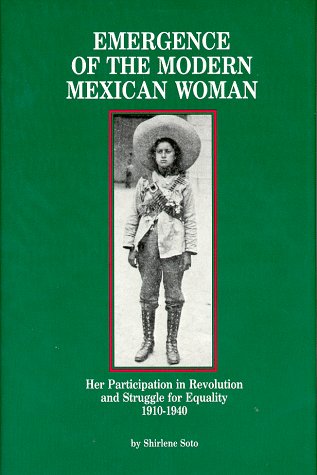Items related to Emergence of the Modern Mexican Woman: Her Participation...
Emergence of the Modern Mexican Woman: Her Participation in Revolution and Struggle for Equality, 1910-1940 (Women and Modern Revolution Series) - Hardcover

Shirlene Soto completes the history of the Mexican Revolution by introducing readers to the heroic women who risked their lives in a long and difficult struggle to attain freedom and equality. Revolutionary women set into play an irresistible momentum that culminated eventually in the attainment of suffrage for all Mexican women. In 1974, Mexico adopted the equivalent of the proposed U.S. Equal Rights Amendment. That same year the Civil Code was revised to give Mexican women equal rights and obligations in marriage and divorce. In 1975, Mexico assumed an international leadership role in women's rights by hosting the United Nations An~o Internacional de la Mujer (International Women's Year) meeting in Mexico City.
Despite these significant gains, serious socioeconomic inequalities persist in Mexico today and are waiting to be addressed by a new set of leaders among the ranks of Mexican women. The courageous revolutionary women who laid the groundwork for the emergence of the modern Mexican woman left a rich cultural heritage that challenges her to persevere in the struggle for equality.
"synopsis" may belong to another edition of this title.
Considering that scholars have analyzed the Mexican Revolution from a wide range of perspectives, the paucity of studies dealing specifically with the role of Mexican women in the Revolution is disappointing. The focus of most scholars on political and diplomatic events of the Revolution--events in which the role of women was generally limited--has resulted in little acknowledgment of the significant roles played by women in so many other areas that were fundamental to the Revolution's success. To rectify such historical omissions, this work focuses upon women's participation in the Mexican Revolution (1910-1940) and in the Mexican women's rights movement during this thirty-year period.
The stage was first set for significant changes in the status of Mexican women, and for the emergence of women revolutionary leaders, during the pre-revolutionary Porfiriato period (1876-1910). During these thirty-five years, appreciable numbers of middle-class Mexican women were able to receive a formal education and to enter various professions for the first time. Following the Porfiriato, the revolutionary period served to further catalyze changes for women because of geographical displacement from home regions and wider ranges of occupational opportunities. In addition to filling such traditional roles as nurses, teachers, and office workers, revolutionary women assumed new roles as military commanders, soldaderas, union organizers, tradespersons, and writers.
During the early revolutionary period (1910-1920), women succeeded in acquiring additional, though limited, legal rights. Divorce was permitted for the first time, and the 1917 Constitution guaranteed some rights for working women. However, political equality remained elusively outside women's grasp, primarily because of women's traditionally close relationship with the Roman Catholic Church. (Revolutionaries believed church influence had to be destroyed if the Revolution were to succeed.)
Between 1915 and 1924, the most intense struggle for women's rights in Mexico centered in the state of Yucatan. Site of the first two feminist congresses, Yucatan was the scene of the most active social, political, and economic participation by women in Mexico. Yucatan's leadership in the women's movement can be attributed to the support of its two Socialist governors, the progressive ideas and activism of its women leaders, and the economic base derived from its highly profitable henequen crops.
The assassination of the Yucatan governor in 1924 abruptly halted nine successive years of Yucatan social reform. The next administration dissolved women's organizations, removed women from their positions in municipal and state government, cancelled women's suffrage, and halted social programs. Consequently, the momentum of the Mexican women's movement shifted from Yucatan to Mexico City.
Mexican women achieved only limited success in their struggle for equality in the period from 1920 to 1934. After helping to win the Revolution and to carry out many revolutionary reforms, especially in the fields of education and health, women received few immediate benefits.
During the six-year presidency of Lzaro Crdenas (1934-1940), women continued to work concertedly toward achieving suffrage. They now faced fewer political obstacles than in the past because both the church and the state sought women's allegiance. Women's groups were organized and incorporated into the official state party. In 1936, the official party granted women the right to vote in party primaries, and a few states enacted women's suffrage. In 1938, a national suffrage amendment passed both houses of Congress and was ratified by all twenty-eight states. However, Congress adjourned without completing the ratification process, and the suffrage amendment never became law.
Despite their important contributions to the Revolution, Mexican women leaders remained largely unrecognized during the post-revolutionary period. A few revolutionary women were awarded small pensions, and some were even commissioned with rank, but many of them lived out their lives in poverty and died relatively unknown.
Widespread disillusionment occurred when women realized that they were not to receive their promised share of the Revolution's benefits. The harsh reality was that Mexican women were not to attain national suffrage until 1953, and they were not to vote in a national election until 1958.
"About this title" may belong to another edition of this title.
- PublisherArden Pr
- Publication date1990
- ISBN 10 0912869119
- ISBN 13 9780912869117
- BindingHardcover
- Number of pages199
- Rating
Shipping:
US$ 3.99
Within U.S.A.
Top Search Results from the AbeBooks Marketplace
Emergence of the Modern Mexican Woman: Her Participation in Revolution and Struggle for Equality, 1910-1940 (Women and Modern Revolution Series)
Book Description hardcover. Condition: Good. May have some shelf-wear due to normal use. Your purchase funds free job training and education in the greater Seattle area. Thank you for supporting Goodwill's nonprofit mission!. Seller Inventory # 0KVOFY00FX7H_ns

